Is kingmaking a problem to be solved?
Exploring the three-player problem via Cole Wehrle's defense of kingmaking
Welcome to Skeleton Code Machine, a weekly publication that explores tabletop game mechanisms. Spark your creativity as a game designer or enthusiast, and think differently about how games work. Check out Dungeon Dice and 8 Kinds of Fun to get started!
This week we are looking at Lewis Pulsipher’s “The Three-Player Problem” from Tabletop: Analog Game Design (Costikyan & Davidson, 2011), and exploring kingmaking in games. If you missed it, be sure to check out Part 1 first!
In today’s Part 2, we delve deeper into kingmaking…
Review of the three-player problem
Last time we defined the three-player problem:
In a three-player conflict game (e.g. a historical wargame) if there are three players, the two players who are behind will generally team up and attack the player in the lead.
And looked at four specific problems in three-player board games:
Turtling: A gameplay strategy that focuses solely on defense rather than offense, usually showing up in area control games.
Leader bashing: Pulsipher defines leader bashing as “simply the tendency to attack whoever is ahead.”
Sandbagging: The inverse of leader bashing is sandbagging, where a player attempts to obfuscate how well they are doing.
Kingmaking: A kingmaking scenario is the more common term for what Pulsipher calls the “petty diplomacy problem.” Petty diplomacy or kingmaking means that the winner of the game is not determined by the “best player” but rather arbitrarily by a player who thinks they will lose anyway.
A number of possible solutions are presented by Pulsipher. I listed those and a few others (seven total), in the previous part of this series.
But it left me wondering… are these problems to be solved?
The kingmaking problem
Let’s look at kingmaking specifically.
Of the four problems listed above, kingmaking is perhaps the one that draws the most ire from modern board gamers.
The RPG.net wiki touches on why:
Kingmaker problem: A problem arising in game design - typically board or card games - whereby it is possible for a player who themselves has no chance of winning, to decide which other player will win. … This is a problem because a kingmaking player, having no possibility of winning the game, no longer has any value for in-game resources; thus, their decision as to who to enable to win must be made via other factors, such as out-of-game grudges or friendships, or "revenge" for actions in earlier play (which can stagnate the game as players become reticent to attack each other for fear of revenge later on).
Kingmaking can break the magic circle of the game, allowing the outside world to seep into the gameplay. In return, actions in the game may have consequences outside the world of the game…. impacting actual relationships.
Kingmaking can also seemingly violate the social contract of the game — the tacit agreement that everyone will play fairly and that the “best player” will win.
While turtling and sandbagging may be frowned upon as strategies, kingmaking causes more visceral reactions in players.
Kingmaking seems to strike at the very core of why we play board games.
Cole Wehrle’s defense of kingmaking
Cole Wehrle’s “King Me: A Defense of King-Making in Board Game Design” presentation at GDC is fascinating.
Having watched it a while ago, I couldn’t help but think of this video while reading about kingmaking and the three-player problem in Tabletop: Analog Game Design.
As the designer of games like Root (2018), Pax Pamir: Second Edition (2019), Oath: Chronicles of Empire & Exile (2021), and John Company: Second Edition (2022), Cole knows a lot about kingmaking in board games.
Root, he says, is “a very mean game”:
There is no catch-up mechanism for players who fall behind.
Actions are mostly zero-sum.
It’s a game with high player interaction.
It has high variance (i.e. it plays differently every time)
Part of that “meanness” is related to kingmaking, for which he makes no apology:
… ultimately Root is a game about kingmaking. I always have a good laugh when I see a thread and someone’s like, “Oh man, Root. I heard that it has a kingmaking problem.” I’m like, it doesn’t have a kingmaking problem, it is the kingmaking problem.
He then walks through a history of kingmaking and the expectation of “fairness” in games starting with Richard Neville, 16th Earl of Warwick up to popular board games of the Victorian era such as The Mansion of Happiness: An Instructive Moral and Entertaining Amusement published from 1800 to 1926, by way of David Hume.
It’s a sweeping and meandering history, and I can’t recommend watching the full video enough!
He then proceeds to give a strong defense of kingmaking in board games, explaining why it doesn’t deserve the hate it receives, but also why it can be one of the best tools for narrative design.
Here are my key lessons from the talk…
Avoiding narrative clichés
The example Cole gives is that in classic rom-coms (e.g. Sleepless in Seattle), we know that the two main characters will end up together. We aren’t looking for a surprise ending, because we sort of already know how it ends. What we want is to see the story of how they get there — what happens between the meet cute and the happy ending.
There’s nothing wrong with movies like that, but if you want to subvert the clichés and have unbounded stories, you need to break some of those rules.
If tabletop games are fundamentally storytelling games, kingmaking is one way to avoid clichés. It allows for stories about manipulation, alliances, and betrayal that extend beyond just the mechanical parts of the game.
It’s notable that he calls out single-session, indie TTRPGs as the best example of doing this type of storytelling. Specifically he mentions The Quiet Year and Dialect.
The goal of the game
Cole mentions the famous quote by game designer Reiner Knizia:
When playing a game, the goal is to win, but it is the goal that is important, not the winning.
I’ve recited this quote multiple times myself! I’ve often used it to both explain how it’s fun to play games regardless if you win or lose, and excuse my chronically low win percentage.
The quote does, however, focus entirely on the individual experience of the game and not the collective. When in reality, the “game is the medium that allows the players to interact with each other.” It is not only about individual players choosing to care about winning, it’s also about the intersection of those decisions and goals.
When you shift the idea of individuals playing a game trying to win, to a group of players interacting… ideas like kingmaking are bound to happen.
Victory conditions
Interestingly, Cole says that the endgame victory conditions are first thing he designs and the last thing he would want to change. That probably because, in most games, victory conditions are the most important part of the game. They are the reason the players take actions.
An alternate view of victory conditions can be seen, however, in the Do board games need victory conditions? video by Amabel Holland, designer of Endurance (2023) and Irish Gauge (2014).
As Cole points out, while victory conditions can be important, sometimes they are less important than the storytelling of the game. With a strong enough narrative, players will want to keep playing even if they can’t win… or even if winning was never possible.
By expanding the boundaries of the game past just the victory conditions, it allows space for storytelling that exists beyond the mechanisms. The story that emerges and is told after the game becomes more about who formed an alliance, who attacked out of revenge, and how an old grudge caused a coup that resulted in kingmaking.
Different players and different types of fun
Once again we come back to the different types of players and the different types of fun.
Some players want a “fair” game of pure competition, and have no interest in narrative, storytelling, or interactions. There’s nothing wrong with that.
Other players might care more about the story, the emergent narrative, and tales that are told after the game. That’s a valid way to play as well.
I do think that, depending on your design goals, Cole makes a compelling case that kingmaking isn’t always a bad thing. It’s a powerful tool in a designers toolbox, and probably one that should be used with caution and specific intention.
Read the book and watch the videos
Want to learn more? I highly recommend the following:
Tabletop: Analog Game Design by Greg Costikyan & Drew Davidson, published by Carnegie Mellon University ETC Press.
"King Me": A Defense of King-Making in Board Game Design by Cole Wehrle
Do board games need victory conditions? by Amabel Holland
Conclusion
Some things to think about:
Kingmaking can be divisive: Some players absolutely hate it and have a visceral reaction to it popping up in their games. Other players see it as a way to improve the storytelling and experience of the game.
Problems to solve: As we look back on the three-body problem, I think it’s clear that turtling, kingmaking, and bash the leader aren’t always problems to solve. Certainly they are sometimes, but like using outdated mechanisms… the answer is usually “it depends.”
Consent matters: When the game has the potential to mix real-world relationships with in-game mechanisms, make sure everyone accepts the concept and chooses to play the game. Cole points out that if this isn’t highlighted ahead of time, kingmaking can feel like a cruel joke rather than a coup.
What do you think? Is kingmaking in tabletop games a problem to be solved or a feature to be enjoyed?
— E.P. 💀
P.S. If you enjoy reading Skeleton Code Machine, nominating it for "Best Blog or Article Written in the TTRPG Space" is a great way to show your support! Nominate Skeleton Code Machine! Submissions end May 31, 2024.
Skeleton Code Machine is a production of Exeunt Press. All previous posts are in the Archive on the web. If you want to see what else is happening at Exeunt Press, check out the Exeunt Omnes newsletter.

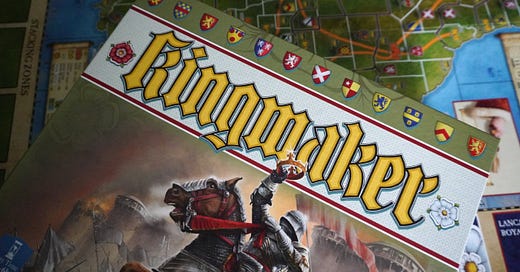


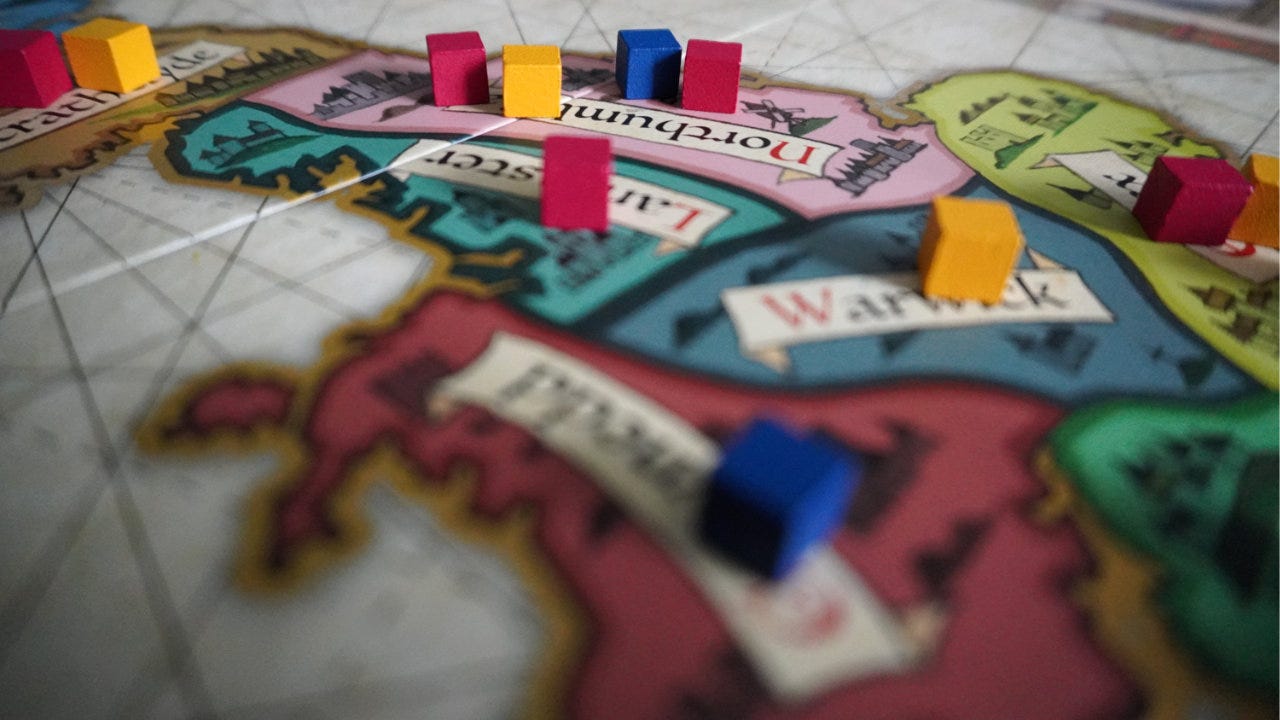

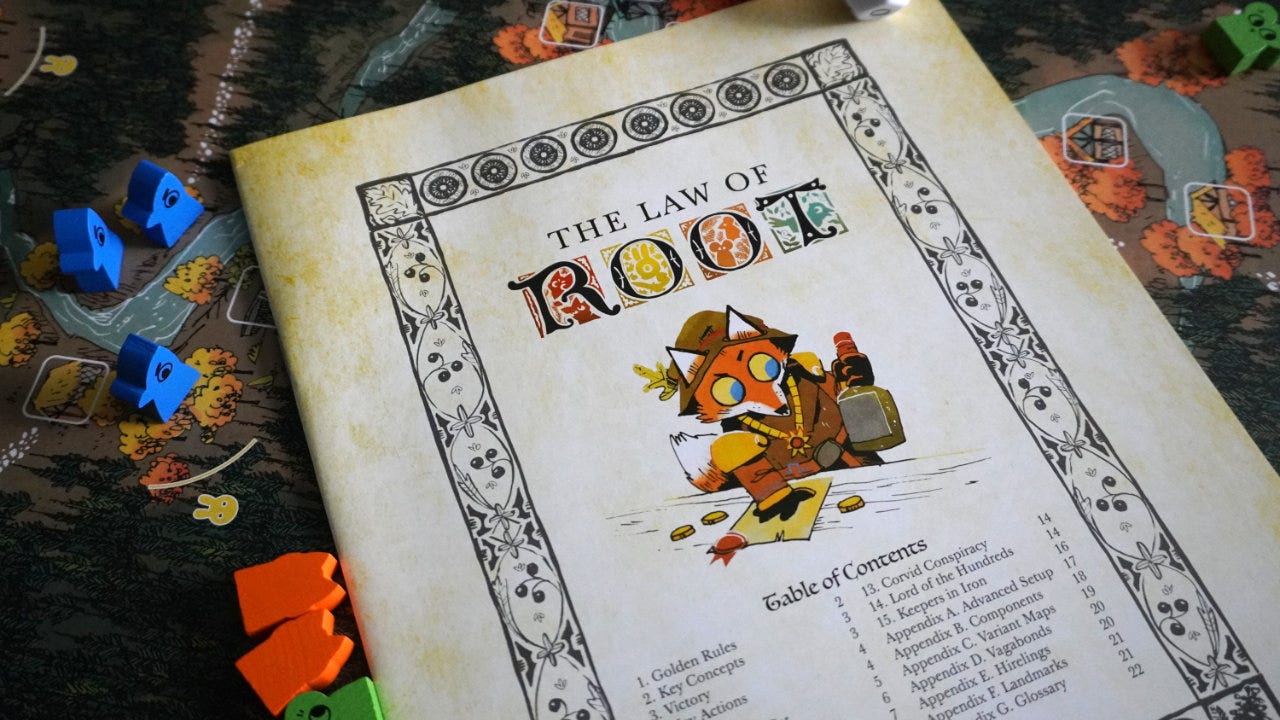
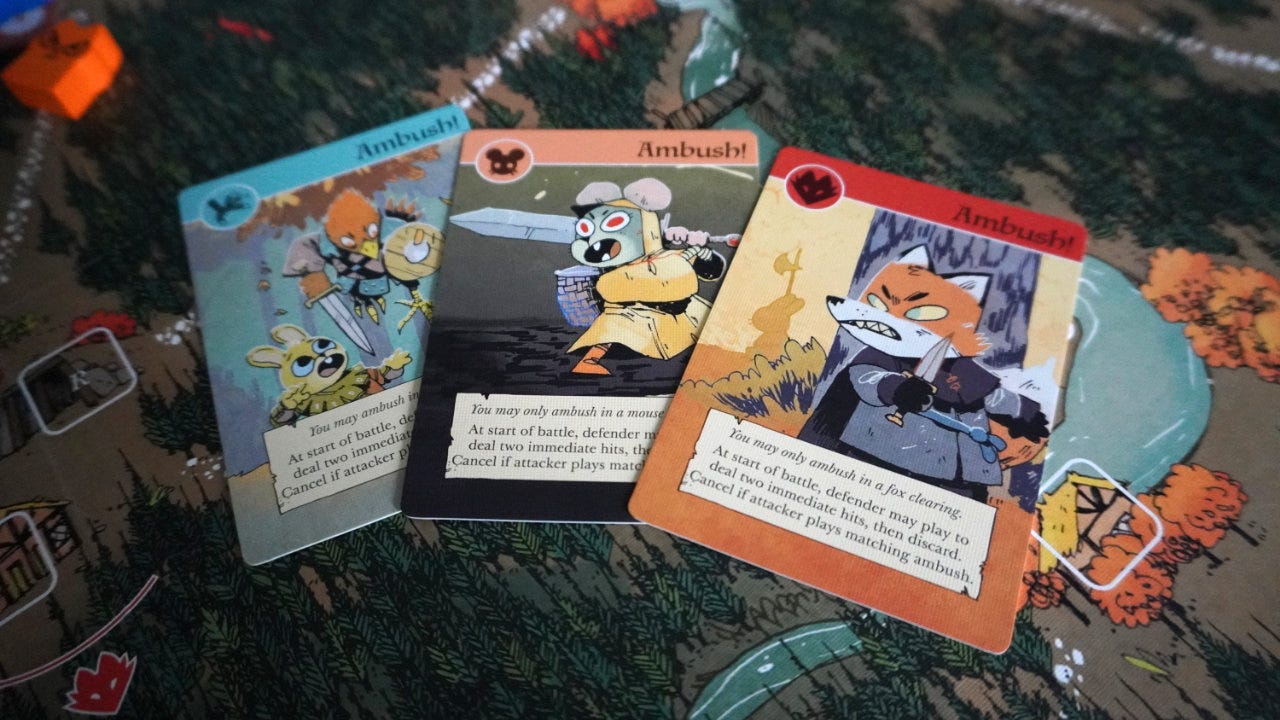




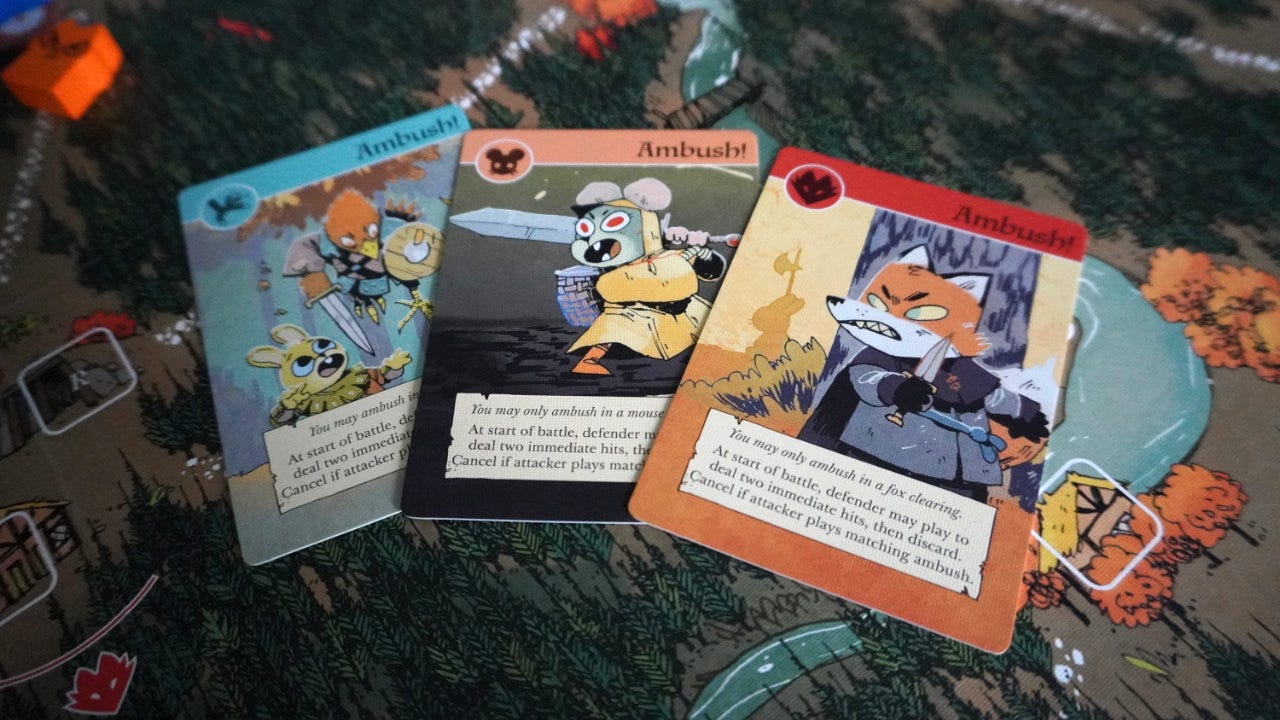
This is really interesting. Thinking out loud, is there an argument to state social interaction as part of the rules? Or at least state their effects up front?
If the issue with kingmaking comes to some degree from it not being in the mechanics of the game but, more from the players playing. If it was stated in the rules that social interaction was an embedded part of the gameplay, could it help set expectations?
Would that be enough to prompt a player looking for fun in their mastery of the mechanics to think of social interaction as part of said mechanics, giving them another tool to play with, rather than against?
Another excellent write up. Root has been my #1 game for years, but I've got friends who I can't get to play it anymore. Cole is probably also my favorite game designer to follow and read thoughts of.
I know people can really take the kingmaking thing hard and as a big negative. I feel like the variance of the factions of Root keeps it worth playing every time to see what will happen.